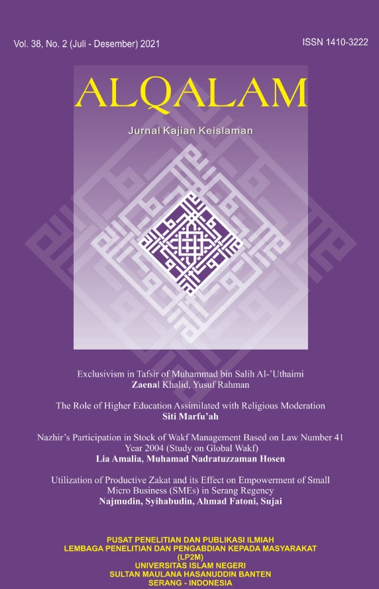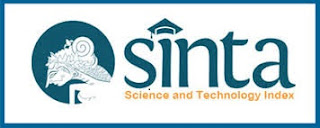Islamic Worldview as The Basic of Islamic Society toward Society 5.0
DOI:
https://doi.org/10.32678/alqalam.v38i2.5360Keywords:
Worldview, Islamic Society, Society 5.0Abstract
Society 5.0, the basic plan of science in the development of science and technology, the results of the previous 4 phases of reform; (Hunting), (Agricultural), (Industrial), and (Information). Until the fourth phase, the speed of knowledge is fast, but the flow of information is inadequate, social reforms arise, packaged into creative innovations to solve problems in parallel, grand design; IoT (Internet of Things), AI (Artificial Intelligence), and Big Data. Innovations that ensure the disappearance of regional disparities provide a wide range of service products. However, the problem has penetrated, because of the partial point of view, even though it has multidimensional aims. Islam runs in place, an ecological crisis, spiritual crisis, even moral crisis. This research is aimed at re-awakening that the development of science has existed for a long time. Through Islamic scientists, has been proven factually with worldview. The method used in this research is a qualitative literature method, researching literature data that is in accordance with the theme, both from journals, books, and related articles. By focusing the object of research on Muslim communities who tend to live in a generation of digital development. And from this research, it can be said that if the worldview of Islam is applied consistently, the following implications will be realized; First, changing the world-centered view to God-centered. Second; changing the materialism system into an integral method of thinking. Third; knowledge sourced from revelation is strengthened by reason and intuition. Fourth; composed of basic elements, and from them determine change, development, and progress.
Keywords: Islamic Worldview, Islamic Society, Society 5.0
Downloads
References
Acikgence, A. (1996). The Framework for A history of Islamic Philosophy. In Al-Shajarah, Journal of The International Institute of Islamic Thought and Civilization (ISTAC) (Vol. 1, Issues 1–6, pp. 1–15).
Ali Yunus. (1987). Sejarah Kesusastraan Arab. Bumi Ilmu.
Alparslan Acikgence. (2014). Islamic Scientific Tradition in History. IKIM.
Anas, M. (2017). Kritik Hossein Nasr Atas Problem Sains Dan Modernitas. Kalam, 6(1), 21. https://doi.org/10.24042/klm.v6i1.391
Anton Bakker, A. C. Z. (1990). Metodologi Penelitian Filsafat. Kanisius.
Asy’ari, H. (2018). Renaisans Eropa dan Transmisi Keilmuan Islam ke Eropa. JUSPI: Jurnal Sejarah Peradaban Islam, vol.2(no.1), 1–14.
Besar, M. S. (2008). Teknologi Nusantara: 40 Abad Hambatan Inovasi. Salemba.
Bobbi Aidi Rahman. (2018). Kontribusi Sastra Arab terhadap Perkembangan Peradaban Barat. Islam Realitas: Journal of Islamic and Social Studies, 4(Juli-Desember).
Fahmy Zarkasyi, H. (2015). Tamaddun sebagai konsep peradaban Islam. Tsaqafah, 11(1), 1–28.
Harayama, Y. (2018). Society 5.0: Aiming for a New Human-centered Society - Japan’s Science and Technology Policies for Addressing Global Social Challenges. Cover Story Collaborative Creation through Global R&D TRENDS in Hitachi Review, 66(6), 553–559.
Haryati, T. A. (2012). Modernitas Dalam Perspektif Seyyed Hossein Nasr. Jurnal Penelitian, 8(2). https://doi.org/10.28918/jupe.v8i2.84
Imam Suprayogo, T. (2002). Metodologi Penelitian Sosial Agama. Remaja Rosdakarya.
Muhyar Fanani. (2008). Metode Studi Islam, Aplikasi Sosiologi Pengetahuan sebagai Cara Pandang. Pustaka Pelajar.
Nasr, Seyyed Hossein, terj. L. H. (1983). Islam dan Nestapa Manusia Modern. Pustaka.
Ninian Smart. (n.d.). Worldview, Crosscultural Explorations of Human Belief. Charles Sribner’s sons.
Phillip K. Hitti. (2002). History of The Arabs. Palgrave Macmillan.
Sarjuni, S. (2019). Islamic Worldview Dan Lahirnya Tradisi Ilmiah Di Institusi Pendidikan Islam. TA’DIBUNA: Jurnal Pendidikan Agama Islam, 2(2), 25. https://doi.org/10.30659/jpai.2.2.25-43
Wall, T. (2001). Thinking Critically About Philosophical Problem. A Modern Introduction, Wadsworth, Thomson Learning.














